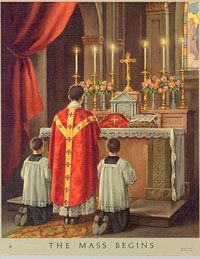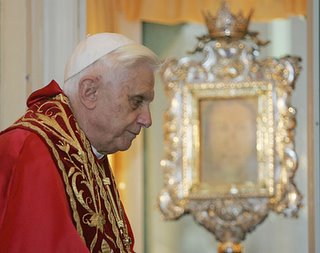
While traveling through Baltimore this Sunday, I thought it would be fun to visit the Basilica of the Assumption, the first cathedral built on US soil. The church itself is undergoing renovation (it is due to be dedicated in November) so a visit was out. Meantime, Mass is celebrated in nearby St. Alphonsus Church. Looking through the Mass times, I noticed that the 11:30 mass was a Tridentine service. Since I had not attended one since the 60s (and hardly remembered it) and my kids and formerly-Lutheran wife had never experienced it, I thought it would be fun to give it a try. I even wondered whether the oft-remarked beauty of the old Mass would rub off on me and make me a believer.
It was not to be. Without giving a play-by-play, let’s just say that the Mass was weird and uninspiring.
The Church was about 1/3 full, with many women wearing lacy head veils. When we arrived 15 minutes before Mass, the recitation of the rosary was going full bore. These were no Rosary pikers either. Each decade was completed with (I think) the Fatima prayer, which goes like this:
"O my Jesus/ forgive us our sins/ save us from the fires of hell/ lead all souls to Heaven/ especially those in most need of Thy mercy. Amen.
Surely, it was clear that we were not dealing with the liberal wing of the RC Church.
Anyway, I wasn’t sure whether the start of Mass at 11:30 would interrupt the recitation, but I needn’t have fretted. The Rosary continued past the last decade, past the Salve Regina, skimming past 11:30, not ending until it had wound its way back down the stem of the Rosary, ending where it began with the Nicene Creed. Whoa! Two Creeds! These people were hard core!
The Rosary over, the Mass was allowed to begin, announced by the the ringing of a bell in the sanctuary.
I won’t bore you with details of the Mass, but here are some highlights and impressions:
1) The priest’s voice was not amplified. This torqued my wife, who was hoping at least to appreciate the Latin being spoken, which leads us to…
2) Aside from being impossible to hear, the Latin was slurred and unintelligible. One prayer, which goes “Domine, non sum dignus, ut intres sub tectum meum: sed tantum dic verbo, et sanabitur anima mea” (Lord, I am not worthy, …) is meant to be repeated three times. The priest at this Mass literally said, “Dominum, Dominum, Dominum.” So much for a) the beauty of the Latin, and b) any reverent recitation of the prayer itself.
3) The priest kept turning to the congregation to say “Dominum vobiscum” (The Lord be with you) but only the servers responded – though, truth be told, many in the congregation whispered the response (“Et cum spiritu tuo”) under their breaths. The pagans!
4) There was no music, as it was Low Mass, but there
were lots of bells, which I do like. Score one for Trent.
5) The young altar servers were in a constant frenzy of movement, going back and forth across the sanctuary, genuflecting every time they passed the Church’s midline, moving the lectionary from one side to the other, lifting the back of the priest’s vestments during the Elevation, and so on.
6) The priest read the Epistle and Gospel in Latin, and only to himself!!!
7) There was a second Confiteor before the people received Communion. I understand that the Latin Mass is really set up only for the priest to receive. Communion for the people seems to have been tacked on, requiring its own rite of confession of sins.
8) After the “Ite Missa Est” (“The Mass is ended”) and blessing, another section of 3 Hail Marys, a Salve Regina and an odd prayer to Michael the Archangel were recited by those who had missalettes.
In short, this “beautiful” Latin Mass was a bust. It was boring, rushed and unbalanced. More than anything else, it is very clear that it was a jerry-rigged mess of weird parts which were badly designed and incompetently assembled. It was a junkyard wreck whose headlights were duct-taped on and whose fenders were held on with baling wire.
Truly, I was surprised. But I now have a better appreciation of why this Mass was in such need of a complete makeover. It’s too bad that some of its beautiful aspects – the smells, bells, chants and ceremony – could not have survived. But given what was gained with the Paul VI Mass – extended readings from the Old Testament, responses made by the congregation, singing at all Masses, Sign of Peace, etc. – what was lost is almost acceptable.
As my wife remarked after Mass, it’s as though a certain segment of the Catholic population enjoys living in a time warp. For these people, it’s always 1954, before “those heretics” started mucking around with the Mass. Sadly, for these people, the chief problem with the Church of old was not the way it hung onto a liturgical form, but the way that it encouraged people to never change. And change (or in theological language,
conversion) is at the heart of the Christian message.
What do you suppose Jesus would say to people who refused conversion?





